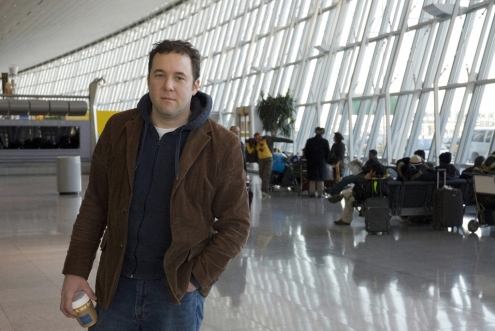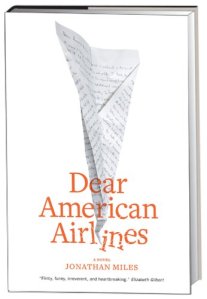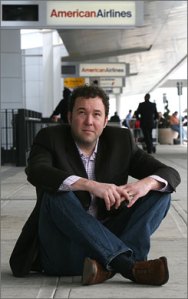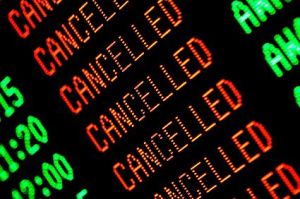
Jonathan Miles has spent years writing for various magazines and newspapers around the country. He is currently a columnist and editor at Men’s Journal and writes the biweekly cocktails column “Shaken and Stirred” for the New York Times. He has also had pieces featured in the Best American Sports Writing and Best American Crime Writing anthologies. In June of 2008 he published his first novel Dear American Airlines (read our full review here). Based loosely on the author’s own experience of being stranded without rescue at O’Hare, Dear American Airlines is a beautiful, insightful, and hilarious novel. We recently had the chance to speak with Mr. Miles via email.
Evanston Public Library: I’d like to start off by asking you an extremely broad question: why did you write this book? You’ve been writing journalism for years, and I’m assuming that like most writers of any sort that somewhere along the line you’ve at least thought about writing a novel. So what I’m wondering is why this book and why now? It strikes me as a book that would not have rung so true had it not been written by a writer of a certain age, with enough time on Earth to get knocked around by life a bit and develop a few grudges and regrets. Something that kept running through my head as I thought about your book was a quote from Bob Dylan about “Tangled Up in Blue.” He said that it took him “Ten years to live and two years to write.” I understand that your story is not autobiographical, but it does seem like maybe there is a lot of you, your personality, your voice, your experience in the character of Bennie. Do you think that you could have written this book at another point in your life and do you think it would have been as raw and immediate as it is?
Jonathan Miles: When people ask me how long it took me to write the novel, I’m torn between two answers, both of them true: two years or twenty years. Because, while it took me two years to go from the first page to the last, I first started trying to write a novel eighteen years before that. Eighteen years of false starts, dashed hopes, moping, drinking, mulling, resuscitated hopes, then many more false starts (even one start that took me 700 pages to realize was false). I didn’t have the benefit—though I’m not convinced it’s actually a benefit—of an M.F.A. program. I just felt my way through the dark, as best I could, though I did have the grand fortune to have my path lit by the late, great novelist Larry Brown, who found me in a Mississippi bar and more or less adopted me. I went into journalism, haphazardly, because I couldn’t seem to hold any other jobs (bartending, librarying, landscaping) for very long, and it seemed like a sly way to get paid to practice writing (or typing at least). But I always considered my journalism career a kind of moonlighting gig, even when that was difficult to justify. All of which may answer the question of why I wrote this book: It’s all I ever really wanted to do.
Could I have written this particular novel at any other time in my life? Doubtful. I don’t know how much of me is tangled up in Bennie—on the surface, very little (I know this breaks the mold of the typical debut novel, but there’s precious little autobiography tucked into those pages); on a deeper, more instinctual level, numerous stray bits and pieces, I’m sure—but I suspect I would’ve been unable to channel Bennie’s voice, say, in my twenties. You have to collect a few scars to be able to imagine the stories behind someone else’s scars. And at a certain point, when you shake off the narcissism of youth, you stop talking and you start to listen. That’s crucial.
EPL: Another thing about your book that rings extremely true  to me is your characterization of Bennie’s fellow travelers, namely everyday Americans. This book seems to present an amazingly concise and accurate (albeit encapsulated) vision of our culture right now. As a journalist and magazine writer, I’m guessing that you spend your fair share of time in our nation’s airports. There was a time when traveling was a big deal, and a classy affair, but today it seems that airports represent the worst our culture has to offer–bad corporate food chains, unnecessary corporate shopping opportunities around every corner, the endless white noise of the TV news channel locked into the overhead televisions, rude, stressed out people, and of course the ubiquitous cell-phone. Would you agree with this assessment? Do you spend a lot of your time observing or meeting your fellow travelers while in the airport?
to me is your characterization of Bennie’s fellow travelers, namely everyday Americans. This book seems to present an amazingly concise and accurate (albeit encapsulated) vision of our culture right now. As a journalist and magazine writer, I’m guessing that you spend your fair share of time in our nation’s airports. There was a time when traveling was a big deal, and a classy affair, but today it seems that airports represent the worst our culture has to offer–bad corporate food chains, unnecessary corporate shopping opportunities around every corner, the endless white noise of the TV news channel locked into the overhead televisions, rude, stressed out people, and of course the ubiquitous cell-phone. Would you agree with this assessment? Do you spend a lot of your time observing or meeting your fellow travelers while in the airport?
JM: Airports strike me as ideal petri dishes for the examination of the national character. (A songwriter I once interviewed said much the same thing about shopping mall food courts.) You have a random sampling of the population stuffed into an antiseptic terminal, stripped of much of the context that defines them. And even though the rise of first-class lounges has skimmed off a certain privileged percentage, the terminals are essentially democratic spaces: we’re all in this muck together. I used to spend a lot of time in airports, back when I was doing a greater share of magazine journalism, so I had ample time for that examination: ridiculously ample time, as I suppose this novel evidences. You can discover astounding stories at airports. The person next to you strikes up a conversation about the delay (because that’s how conversations always seem to start in airports lately, with the question, “Can you believe this?”), and soon you find out that your chatting partner is headed, say, to Brazil to meet the long-lost twin she just discovered, or to Dallas to say a final goodbye to a dying parent. People will unload their lives to a stranger in an airport. (They’ll do that in bars, too, but they’re harder to understand.)
EPL: In the book, all of Bennie’s (and Walenty’s) grand, dramatic moments and profound revelations seem to occur during moments of travel. Being suspended between two places (sometimes literally, as in the case of air travel) often tends to trigger a temporary shift in our minds. What is it about travel that makes us see and feel things differently?
JM: I’ll return here to what I said, above, about context. When you travel, you’re freed, at least partly, from context: from your home, from your routine, from your job (unless you’re traveling on business, but to some degree even then), from your family, from your immediate commitments, even from your identity. On the road, you’re can be anybody you want to be. When I was a younger man, I used to amuse myself by inventing fake identities which I’d spring on my airline seatmates. (So to the woman on that Miami-to-La Paz, Bolivia flight, circa 1997, who was puzzled by the steady gin-and-tonic consumption of the Baptist missionary seated beside her: Now you know.) That’s a more literal example of my metaphorical point, but you get the picture. A certain clarity can emerge when you shirk all that context, when you’re boiled down to just you and a suitcase. Solvitur ambulando, as St. Jerome wrote: It is solved by walking. Or by flying, as a modern update would have it.
 EPL: I’m very interested in the theme of communication which seems to recur often throughout your book. As someone who doesn’t own a cell phone, I’m acutely aware of our cell-obsessed society, and it seemed quite pointed throughout the book (and perhaps the reason that I like him so much) that Bennie doesn’t own a cell phone either. Everywhere in books and movies today cell phones, PDAs, etc. are popping up in stories, sometimes even affecting key elements of plot. It seems like a rare decision to have a main character who is unequipped with at least a cell phone. What was your thinking behind this decision? What are your own personal thoughts on our tech-obsessed society and the state of how we communicate today?
EPL: I’m very interested in the theme of communication which seems to recur often throughout your book. As someone who doesn’t own a cell phone, I’m acutely aware of our cell-obsessed society, and it seemed quite pointed throughout the book (and perhaps the reason that I like him so much) that Bennie doesn’t own a cell phone either. Everywhere in books and movies today cell phones, PDAs, etc. are popping up in stories, sometimes even affecting key elements of plot. It seems like a rare decision to have a main character who is unequipped with at least a cell phone. What was your thinking behind this decision? What are your own personal thoughts on our tech-obsessed society and the state of how we communicate today?
JM: For Bennie to be truly, deeply trapped, I felt I had to strip him of cell phone, laptop, etc. I wrestled mightily with this, because I didn’t want him to be so much of a Luddite that he’d come across as some odd alien creature, amazed by indoor plumbing. But for him to be terminally trapped—inside his head, I mean, not just inside the airport—I thought he needed to be alone—piercingly alone—with just a pen and paper. No email to check, no websites to surf, no dread Facebook to update (status: “Bennie Ford is sitting in O’Hare, growling”). It was a pragmatic decision, but it definitely colored Bennie’s character. As for my own relationship with techie communication: I’m not quite Bennie, but I’m close. I do have a cell phone but I hate answering it, and usually don’t, earning me severe unaffection from friends and relations. I find Twitter and Facebook et al terribly depressing. They remind me of a girl with whom I went to grade-school. Whenever the teacher asked a question, and even sometimes when there was no question, her hand would shoot up and she’d make an excited monkey noise: ooh, oooh, oooh. But most of the time, when the teacher called on her, she had nothing to say—half the time, she hadn’t heard the question. She just wanted to be noticed. That’s Twitter and Facebook, to me: A billion hands waving in the air, but nothing to say. It’s less communication than exhibitionism—a digital trenchcoat flying open. Of course, now that I’ve offended everybody, I will return to making soap from lye and chinking the holes in my log cabin.
EPL: Finally–and I think that this question is sort of an offshoot  of some of the things I’ve already asked you about-I’d like to ask you about the overarching sense of pent-up and impotent rage that seems to course through your book. It seems that a lot of the rage comes from a sense that we are constantly having our humanity squashed out of us by the corporations running our lives in an effort to turn each of us into the perfect consumer. As an author, part of whose job is to wrestle with our humanity and emotions, do you find this trend troubling? My favorite lines from the book are, “why does this young generation talk endlessly of rage but never succumb to it? I haven’t heard a bona fide howl in years. It’s all spitballs from the back of the room.” How did we get here, and do you see a possibility for the trend to be reversed?
of some of the things I’ve already asked you about-I’d like to ask you about the overarching sense of pent-up and impotent rage that seems to course through your book. It seems that a lot of the rage comes from a sense that we are constantly having our humanity squashed out of us by the corporations running our lives in an effort to turn each of us into the perfect consumer. As an author, part of whose job is to wrestle with our humanity and emotions, do you find this trend troubling? My favorite lines from the book are, “why does this young generation talk endlessly of rage but never succumb to it? I haven’t heard a bona fide howl in years. It’s all spitballs from the back of the room.” How did we get here, and do you see a possibility for the trend to be reversed?
JM: The ways in which we’re tweaked, flattened, abused, ignored, used, and exploited by the mega-corporations that increasingly rule our lives is almost Kafkaesque. But no, scratch that: It is Kafkaesque. Anyone who’s ever spent forty minutes on hold, stewing and simmering, with the phone company or the cable company or an airline understands the helpless rage you feel. Consumer life—and like it or not, that’s become a major component of modern life, wedging its way into almost everything we do—is inhuman and ugly. We’re constantly getting squashed by the pitiless bootheel of our corporate overlords—in small ways, to be sure, but these small indifferences add up until you can feel like a butterfly pinned to some board. Their malevolent influence can feel as inescapable as fate, which is what I wanted Bennie to conflate in the novel. Bennie has a monstrous howl in him, a furious complaint to lodge against life itself. I saw him as a little like Job, raising his arms to the sky and letting loose with an angry lament addressed heavenward. “Thou poured me as milk,” Job wrote, and Bennie quotes, “but curdled me like cheese.” But Bennie is an atheist. He has no God to scream at. So he screams at the closest thing to an omnipresent, implacable, all-powerful, works-in-mysterious ways, micro-and-macro-managing entity he can find: a corporation. His confessor is a customer-service agent. As for this trend being reversed: Not in my lifetime. I fear that by the time I’m an old man my nation will be called the United States of Wal-Mart and our soldiers will wear armbands emblazoned with those little yellow happy faces. Ideologies will cease to exist, replaced by vapid corporate mission statements. Our wars will be fought over trademark infringement. The customer-care operators in Bangalore will warn us, in helpful, friendly tones, not to resist. But resist we shall. And as Bennie says: “I’ll be the one handing out the pitchforks.”
